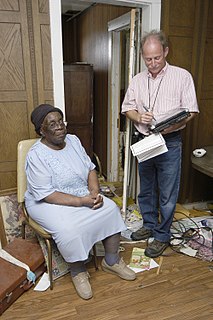
An audit is an "independent examination of financial information of any entity, whether profit oriented or not, irrespective of its size or legal form when such an examination is conducted with a view to express an opinion thereon.” Auditing also attempts to ensure that the books of accounts are properly maintained by the concern as required by law. Auditors consider the propositions before them, obtain evidence, and evaluate the propositions in their auditing report.
This aims to be a complete list of the articles on real estate.
A homeowner association, or a homeowner community, is a private association-like entity often formed either ipso jure in a building with multiple owner-occupancies, or by a real estate developer for the purpose of marketing, managing, and selling homes and lots in a residential subdivision. In the United States, the developer will typically transfer control of the association to the homeowners after selling a predetermined number of lots. Generally any person who wants to buy a residence within the area of a homeowners association must become a member, and therefore must obey the governing documents including Articles of Incorporation, CC&Rs and By-Laws, which may limit the owner's choices in exterior design modifications. Homeowner associations are especially active in urban planning, zoning and land use, decisions that affect the pace of growth, the quality of life, the level of taxation and the value of land in the community. Most homeowner associations are incorporated, and are subject to state statutes that govern non-profit corporations and homeowner associations. State oversight of homeowner associations is minimal, and it varies from state to state. Some states, such as Florida and California, have a large body of HOA law. Other states, such as Massachusetts, have virtually no HOA law. Homeowners associations are commonly found in residential developments since the passage of the Davis–Stirling Common Interest Development Act in 1985.

Due diligence is the investigation or exercise of care that a reasonable business or person is normally expected to take before entering into an agreement or contract with another party or an act with a certain standard of care.

In finance, valuation is the process of determining the present value (PV) of an asset. In a business context, it is often the hypothetical price that a third party would pay for a given asset. Valuations can be done on assets or on liabilities. Valuations are needed for many reasons such as investment analysis, capital budgeting, merger and acquisition transactions, financial reporting, taxable events to determine the proper tax liability.

An inspection is, most generally, an organized examination or formal evaluation exercise. In engineering activities inspection involves the measurements, tests, and gauges applied to certain characteristics in regard to an object or activity. The results are usually compared to specified requirements and standards for determining whether the item or activity is in line with these targets, often with a Standard Inspection Procedure in place to ensure consistent checking. Inspections are usually non-destructive.

In accounting and in most schools of economic thought, fair value is a rational and unbiased estimate of the potential market price of a good, service, or asset. The derivation takes into account such objective factors as the costs associated with production or replacement, market conditions and matters of supply and demand. Subjective factors may also be considered such as the risk characteristics, the cost of and return on capital, and individually perceived utility.
Real estate appraisal, property valuation or land valuation is the process of developing an opinion of value for real property. Real estate transactions often require appraisals because they occur infrequently and every property is unique, unlike corporate stocks, which are traded daily and are identical. The location also plays a key role in valuation. However, since property cannot change location, it is often the upgrades or improvements to the home that can change its value. Appraisal reports form the basis for mortgage loans, settling estates and divorces, taxation, and so on. Sometimes an appraisal report is used to establish a sale price for a property.
The Healthcare Commission was a non-departmental public body sponsored by the Department of Health of the United Kingdom. It was set up to promote and drive improvement in the quality of health care and public health in England and Wales. It aimed to achieve this by becoming an authoritative and trusted source of information and by ensuring that this information is used to drive improvement. The Commission was abolished on 31 March 2009 and its responsibilities in England broadly subsumed by the Care Quality Commission.

Institutional Animal Care and Use Committees (IACUCs) are centrally important in applying laws about animal research in the United States and other countries. Most research involving laboratory animals is funded by the United States National Institutes of Health or, to lesser extents, other federal agencies. The NIH Office of Laboratory Animal Welfare (OLAW) has been directed by law to develop policies that describe the role of Institutional Animal Care and Use Committees.

A home inspection is a limited, non-invasive examination of the condition of a home, often in connection with the sale of that home. Home inspections are usually conducted by a home inspector who has the training and certifications to perform such inspections. The inspector prepares and delivers to the client a written report of findings. The client then uses the knowledge gained to make informed decisions about their pending real estate purchase. The home inspector describes the condition of the home at the time of inspection but does not guarantee future condition, efficiency, or life expectancy of systems or components.
Real estate investing involves the purchase, management and sale or rental of real estate for profit. Improvement of realty property as part of a real estate investment strategy is generally considered to be a sub-specialty of real estate investing called real estate development. Someone who actively or passively invests in real estate is called a real estate entrepreneur or a real estate investor.
Farmland development rights in Suffolk County, New York began in 1975 in Suffolk County as the state of New York began a program to purchase development rights for farmland to insure they remained as farms and open space rather than being developed for housing.
A building inspection is an inspection performed by a building inspector, a person who is employed by either a city, township or county and is usually certified in one or more disciplines qualifying them to make professional judgment about whether a building meets building code requirements. A building inspector may be certified either as a residential or commercial building inspector, as a plumbing, electrical or mechanical inspector, or other specialty-focused inspector who may inspect structures at different stages of completion. Building inspectors may charge a direct fee or a building permit fee. Inspectors may also be able to hold up construction work until inspection has been completed and approved.

In the United States, an environmental site assessment is a report prepared for a real estate holding that identifies potential or existing environmental contamination liabilities. The analysis, often called an ESA, typically addresses both the underlying land as well as physical improvements to the property. A proportion of contaminated sites are "brownfield sites." In severe cases, brownfield sites may be added to the National Priorities List where they will be subject to the U.S. Environmental Protection Agency's Superfund program.

The Wisconsin Department of Revenue (DOR) is an agency of the Wisconsin state government responsible for the administration of all tax laws, as well as valuing property and overseeing the wholesale distribution of alcoholic beverages and enforcement of liquor laws. The Department also administers the state's unclaimed property program and the state lottery.

The United States Grain Standards Act (USGSA) of 1916(P.L. 64-190), as amended, authorizes the Grain Inspection, Packers and Stockyards Administration to establish official marketing standards for grains and oilseeds, and requires that exported grains and oilseeds be officially weighed and inspected. Domestically marketed grain and oilseeds may be, but are not required to be, officially inspected. Export inspections are carried out by federal inspectors or by federally supervised state inspection agencies, called delegated official inspection agencies. Official inspections of domestically traded grain is done by federally supervised state agencies and private companies, called designated official inspection agencies. Typically, marketing standards describe the physical characteristics of the commodity and serve as contract language to facilitate marketing. Official weighing and inspection is paid for on a fee-for service basis, not with federal funds. Major changes to the law were adopted in the USGSA Amendments of 1968, the USGSA of 1976, and the Grain Quality Improvement Act of 1986.

CoreLogic, Inc. is an Irvine, CA-based corporation providing financial, property, and consumer information, analytics, and business intelligence. The company analyzes information assets and data to provide clients with analytics and customized data services. The company also develops proprietary research, and tracks current and historical trends in a number of categories, including consumer credit, capital markets, real estate, fraud, regulatory compliance, natural hazards, and disaster projections. The company reported full 2020 revenue of $1.6 billion. As of 2021, CoreLogic is a Fortune 1000 company.
A broker's price opinion is a report that is performed by a licensed real estate agent, broker or appraiser. It is similar to doing a CMA but most times the real estate professional gets paid to do a BPO. A BPO can be either an Exterior Drive-By or a Full Interior report. When doing a BPO, the real estate professional researches the subject property, takes pictures of it, investigates the neighborhood, as well as retrieve six comparable properties in their MLS. The final BPO is used to support their professional opinion that will help determine the potential selling price or estimated value of a property.

Archaeology and conservation of cultural resources in Ontario fall under the Ministry of Tourism, Culture and Sport. The Province of Ontario has created Acts to insure the protection archaeological and cultural resources. Acts such as the Ontario Heritage Act and Environmental Assessment Act provide the major legal documents that protect heritage and cultural resources. Additionally, Acts such as the Planning Act, the Aggregate Resource Act and the Ontario Cemeteries Act are also implemented when specific triggers occur during archaeological assessments.









